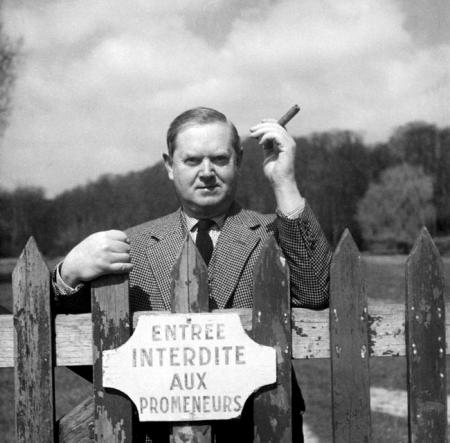“Critics tend as a general rule to do their most memorable writing about works of art that they dislike. In the words of Anton Ego, the haughty restaurant reviewer in Brad Bird’s film Ratatouille, they ‘thrive on negative criticism, which is fun to write and to read.’ So it is–but as any critic can tell you, it’s also harder to praise than to pan. The reason for this is that the language of abuse is vastly more vivid than the language of praise…”
Archives for April 13, 2012
TT: Life studies
In today’s Wall Street Journal drama column, I review three plays that are all based on real-life characters, Side Man, 4000 Miles, and Magic/Bird. Here’s an excerpt.
* * *
Warren Leight is best known in his latter-day capacity as showrunner for “Law & Order: Criminal Intent,” but theater buffs also know him as the author of “Side Man,” a 1998 play about a young man’s attempts to come to grips with the irremediable incompatibility of his trumpet-playing father and alcoholic mother (“The rocks in her head fit the holes in his”). Though it won a best-play Tony in 1999, “Side Man” doesn’t get produced nearly as often as it should, nor is its exceptional quality sufficiently recognized. It is, in fact, one of the most beautiful “memory plays” of the 20th century, a little masterpiece fully worthy of comparison to Brian Friel’s “Philadelphia, Here I Come!” and Lanford Wilson’s “Lemon Sky,” and 1st Stage, a four-year-old theater company located in a suburban strip mall not far from Washington, D.C., has given it a revival that is no less deserving of comparison to the original New York production.
 For those lucky enough to have seen Edie Falco and Frank Wood in “Side Man” 14 years ago, those will be fighting words, but Lee Miseska Gardner’s perormance as “Crazy Terry” Glimmer, who has been driven to drink by the bland, oblivious indifference of her husband Gene (Chris Mancusi), a jazzman who only comes to life on the bandstand, is snarlingly true to life. Mr. Mancusi is with her every step of the way….
For those lucky enough to have seen Edie Falco and Frank Wood in “Side Man” 14 years ago, those will be fighting words, but Lee Miseska Gardner’s perormance as “Crazy Terry” Glimmer, who has been driven to drink by the bland, oblivious indifference of her husband Gene (Chris Mancusi), a jazzman who only comes to life on the bandstand, is snarlingly true to life. Mr. Mancusi is with her every step of the way….
“4000 Miles,” in which Amy Herzog portrays the awkwardly loving relationship between a 91-year-old Communist (Mary Louise Wilson) and her neo-hippie grandson (Gabriel Ebert) who thinks that “Marx is cool,” is the best new play by a young writer to come my way since Brooke Berman’s “Hunting and Gathering.” Part of its excellence arises from the seemingly paradoxical fact that Ms. Herzog has had the good sense not to make “4000 Miles” a political drama (though she takes care not to let the unrepentant grandmother off too lightly). It is, instead, a finely wrought, closely observed character study, funny and serious in just the right proportions. Everyone in the play is believable, and everything they say to one another sounds as real as an overheard conversation.
Not only does Ms. Herzog never put a foot wrong, but Lincoln Center Theater has given “4000 Miles” a production so strong that I can’t see how it could possibly be improved….
Eric Simonson, who brought football to Broadway last season with “Lombardi,” has gone back to the well of big-league sports with “Magic/Bird,” a basketball-themed play about the friendly rivalry between Earvin “Magic” Johnson of the Los Angeles Lakers (played by Kevin Daniels) and Larry Bird (Tug Coker) of the Boston Celtics. Unlike “Lombardi,” a well-crafted family drama that was strong enough to hold the interest of playgoers who knew nothing about Vince Lombardi, “Magic/Bird” is a loosely knit string of evasively one-dimensional vignettes (one might well conclude after watching the play that Mr. Johnson picked up the HIV virus from a toilet seat)….
* * *
Read the whole thing here.
TT: When criticism is no laughing matter
In today’s Wall Street Journal “Sightings” column I endeavor to give my colleagues–and myself–some good advice. Here’s an excerpt.
* * *
The obituaries for Hilton Kramer, the celebrated art critic who died last month, all made prominent mention of his devastatingly terse appraisals of those artists and institutions whose work he found wanting. It was Mr. Kramer, for instance, who dismissed the Whitney Museum of American Art’s biennial exhibitions as “funky, kinky, kitschy claptrap.” But he was no less admired, if far less well known, for his powers as an advocate. Like all great critics, he knew how to praise, and his paeans to such underappreciated American modernists as Fairfield Porter and Milton Avery (whose later canvases he ranked “among the greatest paintings ever produced by an American artist”) did much to make their work more widely known.
Why, then, was this aspect of Mr. Kramer’s long career overlooked when he died? Because bad reviews always make a bigger splash than good ones. And why should this be so? Because critics tend as a general rule to do their most memorable writing about works of art that they dislike. In the words of Anton Ego, the haughty restaurant reviewer in Brad Bird’s film “Ratatouille,” they “thrive on negative criticism, which is fun to write and to read.”
 So it is–but as any critic can tell you, it’s also harder to praise than to pan. The reason for this is that the language of abuse is vastly more vivid than the language of praise. Evelyn Waugh, who in addition to being a great novelist was a superb book reviewer, neatly summed up this problem in a 1937 essay: “There are infinite gradations of blame, a thousand fresh and pungent metaphors for detraction, the epithets of dissatisfaction seem never to stale…but the moment one finds a work which genuinely impresses and delights, there seems no article of expression other than the clichés that grin at one from every publisher’s advertisement.”
So it is–but as any critic can tell you, it’s also harder to praise than to pan. The reason for this is that the language of abuse is vastly more vivid than the language of praise. Evelyn Waugh, who in addition to being a great novelist was a superb book reviewer, neatly summed up this problem in a 1937 essay: “There are infinite gradations of blame, a thousand fresh and pungent metaphors for detraction, the epithets of dissatisfaction seem never to stale…but the moment one finds a work which genuinely impresses and delights, there seems no article of expression other than the clichés that grin at one from every publisher’s advertisement.”
Above all, it’s inordinately difficult to use humor to praise a good work of art, whereas nothing is easier than to crack jokes about a bad one. The drama critic Kenneth Tynan was, like Mr. Kramer, a passionate enthusiast, yet it is his pans that people quote to this day, and the lines that get quoted are invariably the funny ones–very often, to be sure, because their wit is wrapped around a hard core of truth. When Mr. Tynan described T.S. Eliot’s “The Family Reunion” as a “has-been, would-be masterpiece,” or wrote in a review of “Antony and Cleopatra” that Vivien Leigh “picks at the part [of Cleopatra] with the daintiness of a debutante called upon to dismember a stag,” you could hear the thunk of the arrow hitting the bull’s-eye.
What is easiest to do, alas, tends to get done rather more often than it should, and nothing is easier than to make fun of that which you don’t understand….
* * *
Read the whole thing here.
An excerpt from Brad Bird’s Ratatouille. Anton Ego’s voice is dubbed by Peter O’Toole:
TT: Almanac
“Every foole knoweth that hatreds are the cinders of affection.”
Sir Walter Raleigh, letter to Sir Robert Cecil (May 10, 1593)
